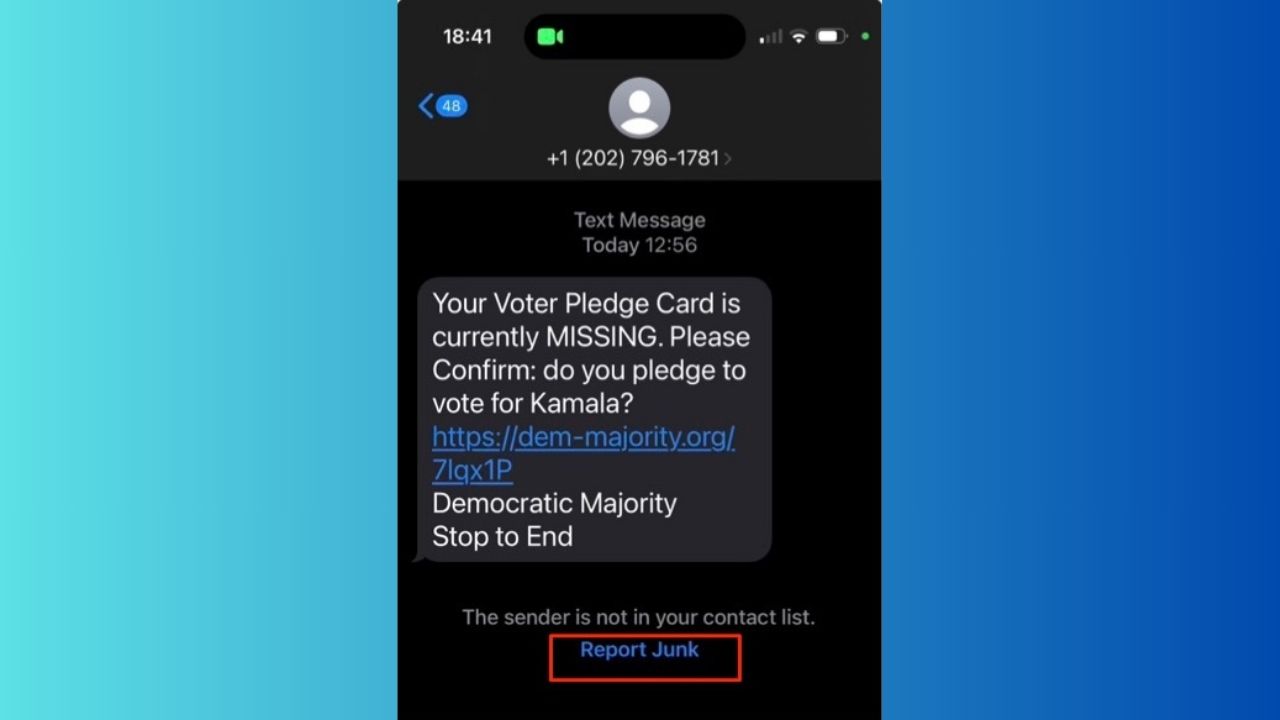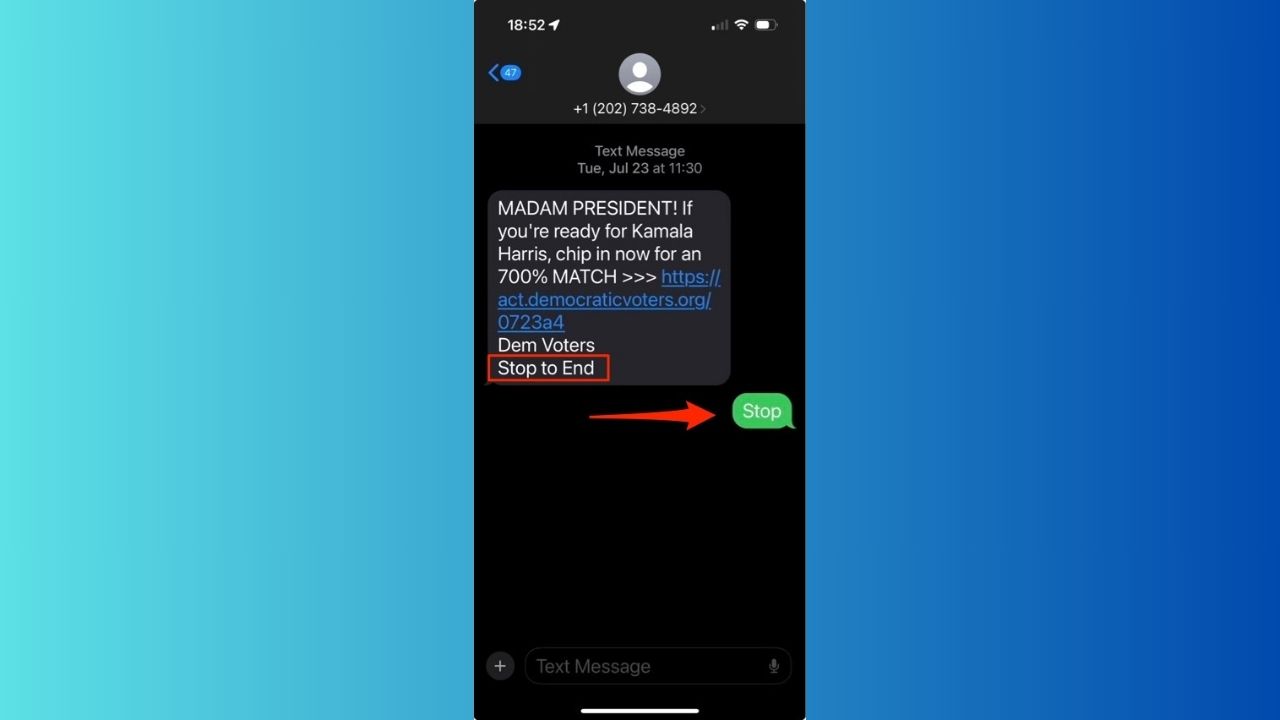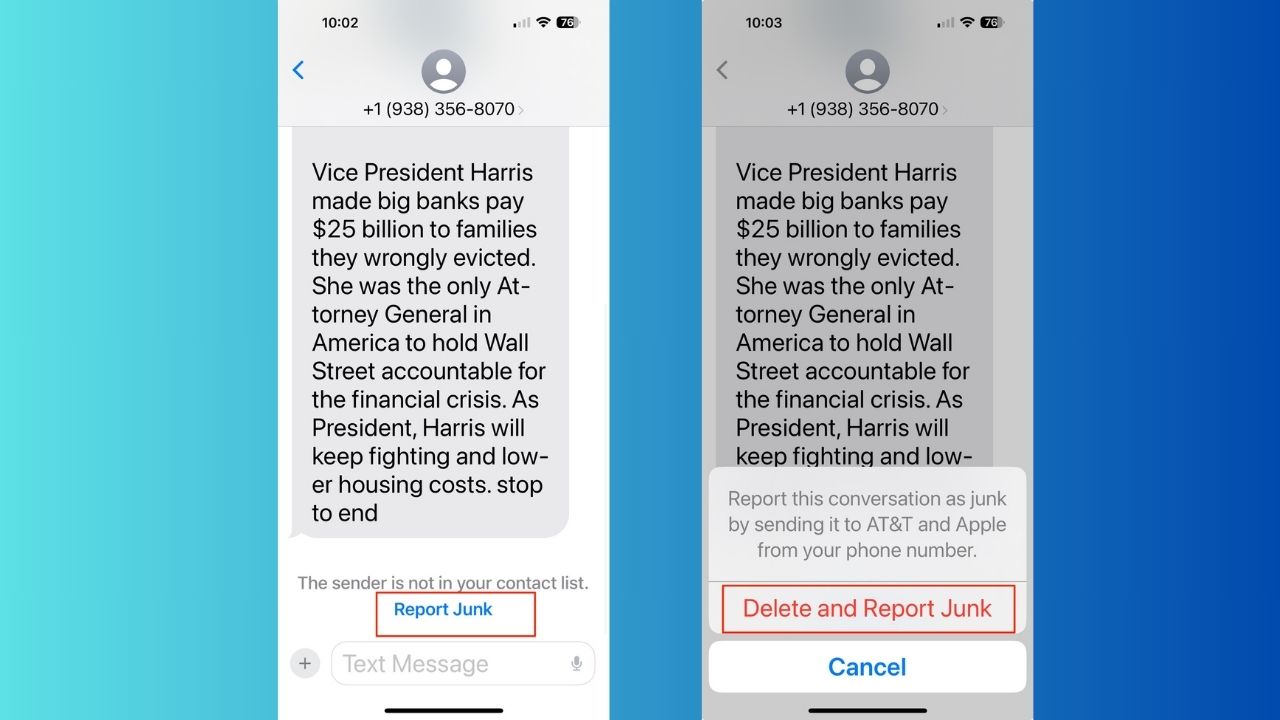Text messages that come to your phone as spam messages are a nuisance at best and a risk to your personal security at worst. But somewhere in between lies a very unique type of spam text messages that include propaganda to convince you of who to vote for in the upcoming election. Of course, this is a nuisance, but is it also something more than that? Something more dangerous that you need to be aware of?
If you’re receiving those unwelcome political text messages from fundraisers, here’s what you need to know about them and how you can reclaim your phone and block those messages for good. With the upcoming election, you should be free to vote without any influence from strangers texting your phone. How did they get your number, anyway?
What are political text messages?
Political text messages are communications sent via SMS by political campaigns, party committees, political action committees (PACs), and interest groups. These messages aim to solicit support, funds, or votes, gauge public opinion through surveys, and provide information about political events and initiatives.
Due to their high open rates and direct reach, they have become a popular tool in modern campaigning. However, there is a risk that such messages can backfire, as recipients may find them intrusive and choose to support a different candidate instead.

How to tell if a political text message is legitimate
As election season approaches, it’s important to be vigilant about the political text messages you receive. While some may be genuine communications from campaigns or organizations, others could be scams designed to deceive you. Here are some tips to help you determine the legitimacy of these messages:
Check for grammatical errors: Fake messages often contain poor grammar, spelling mistakes, or awkward sentence structures. Legitimate organizations typically ensure their communications are free from such errors.
Verify the source: If you receive a message claiming to be from a known political campaign or organization, verify it by contacting them directly using a phone number or website you trust, not the information provided in the message.
Look for unfamiliar numbers: Legitimate political campaigns usually send texts from identified numbers. Scam texts often come from unidentified or unusually long numbers.
Understand brand communication: Familiarize yourself with how political campaigns say they will contact you. Many organizations provide guidelines on their websites about what legitimate communications will look like.

THE 3 MOST DANGEROUS TECH THREATS TO THE 2024 ELECTIONS
How did they get my number?
Political organizations often obtain phone numbers from voter registration records, which include names, addresses, and contact information of registered voters. These records are public and can be accessed by anyone involved in political communications.
Additionally, political groups may purchase phone numbers from data brokers who compile extensive profiles using various data points, including online activity, subscriptions, and demographic information. Essentially, even if you haven’t directly given these campaigners your phone number, they’ve found it online some other way. Here’s how to delete yourself from the web.
Can these messages mean that they can take my information?
While the messages themselves typically do not extract personal information directly, responding to or engaging with these texts can contribute to the data profiles that political organizations maintain.
Each interaction provides additional data points that can be used to refine their outreach strategies. However, be cautious of links within these messages, as they could potentially lead to phishing attempts if not from a legitimate source.
What rules govern political texts
Here’s the thing – you’d think the Do Not Call Registry would help, but sadly, it doesn’t cover political stuff. And those federal laws about phone communications? They’re not much help either.
Why? Well, it’s kind of a sticky situation. See, lawmakers are worried about stepping on First Amendment toes, plus – let’s be honest – they need to reach voters themselves. So, they’re not exactly rushing to put up barriers.
Now, there is one rule: political groups can’t use autodialers to spam you with texts unless you’ve said it’s okay. But here’s the catch – the Supreme Court defined autodialers in a way that lets a lot of texting tech off the hook.
So what does this mean for you? Well, if you’ve ever liked a political meme, taken an online survey about democracy, or donated to a cause, you might’ve put yourself on their radar. It’s like open season for political texters.

HOW AI COULD MANIPULATE VOTERS AND UNDERMINE ELECTIONS, THREATENING DEMOCRACY
Best ways to stop political text messages and stay safe on your phone
1) Block the contact
If you regularly receive calls and messages from the same number, you can block it to prevent those calls and texts from reaching you. This is effective if the messages come from the same number but may be less effective if the sender uses multiple numbers.
On iPhone
- Open the Messages app and locate the political text message.
- Tap on the message to open it.
- Tap on the phone number or contact name at the top of the screen.
- Tap on the “i” information icon.
- Scroll down and select “Block this Caller.”
- Confirm by tapping “Block Contact.”
On Android
Settings may vary depending on your Android phone’s manufacturer
- Open the Messages app and find the political text message.
- Tap and hold the message until a menu appears.
- Tap on the “Block” option (this might also be labeled as “Block number” or “Add to Spam” depending on your device).
- Confirm by tapping “OK” or “Block.”
2) Reply and/or file a complaint
Responding to the text with “Stop,” “Unsubscribe,” or “Cancel” can opt you out of future communications from that sender. The Federal Communications Commission (FCC) also provides options to report unsolicited texts by forwarding them to 7726 (“SPAM”) or filing a complaint online.

3) Delete and report junk
On both iPhone and Android, you can delete and report unwanted messages as junk. Here’s how:
On iPhone:
- If a sender isn’t in your contact list and you haven’t replied, you’ll see a “Report Junk” option below the message.
- Select this option to delete the message and confirm your decision by clicking Delete and Report Junk to report it to Apple and your carrier.
Android:
Settings may vary depending on your Android phone’s manufacturer
- Open the Messages app and find the unwanted message.
- Tap and hold the message until a menu appears.
- Select “Report Spam” or “Report Junk” from the menu.
- Confirm the action to delete the message and report it to your carrier.

4) Filter unknown senders
Both iPhone and Android have features to filter messages from unknown senders, reducing interruptions from unwanted texts.
On iPhone:
- Open the Settings app.
- Scroll down and select Messages.
- Scroll down again to “Filter Unknown Senders” and toggle it on.
On Android:
Settings may vary depending on your Android phone’s manufacturer
- Open the Messages app.
- Tap the three-dot menu icon in the top-right corner.
- Select “Settings” from the dropdown menu.
- Choose “Spam protection.“
- Toggle on “Enable spam protection” to filter messages from unknown senders into a separate folder.
5) Contact the political campaign
As a last resort, you can contact the campaign’s office to report the message. This could help prevent future communications and bring the issue to the campaign’s attention, especially if they are not following best practices.
6) Invest in personal data removal services
To further reduce the number of unwanted political text messages, consider investing in personal data removal services. While no service promises to remove all your data from the internet, having a removal service is great if you want to constantly monitor and automate the process of removing your information from hundreds of sites continuously over a longer period of time.
A service like Incogni can help you remove all this personal information from the internet. It has a very clean interface and will scan 195 websites for your information and remove it and keep it removed.
Special for CyberGuy Readers (60% off): Incogni offers A 30-day money-back guarantee and then charges a special CyberGuy discount only through the links in this article of $5.99/month for one person (billed annually) or $13.19/month for your family (up to 4 people) on their annual plan and get a fully automated data removal service, including recurring removal from 190+ data brokers. You can add up to 3 emails, 3 home addresses and 3 phone numbers (U.S. citizens only) and have them removed from data-broker databases. I recommend the family plan because it works out to only $4.12 per person per month for year-round coverage. It’s an excellent service, and I highly recommend at least trying it out to see what it’s all about.
Get Incogni for your family (up to 4 people) here
7) Never click on links in political texts
Be cautious of links, and do not click links in political texts, as they may contain malware or lead to fraudulent websites. Also, be aware that some political texts may be fake, designed to mislead or defraud you. Scammers often disguise themselves as legitimate political campaigns, nonprofits, or government agencies to exploit the election season’s heightened communication. These fake texts may attempt to extract personal information or solicit fraudulent donations by creating a sense of urgency or panic.
The best way to safeguard yourself from malicious links that install malware and potentially access your private information is to have strong antivirus software installed on all your devices. This protection can also alert you to phishing emails and ransomware scams, keeping your personal information and digital assets safe.
My top pick is TotalAV, and you can get a limited-time deal for CyberGuy readers: $19 your first year (80% off) for the TotalAV Antivirus Pro package.
THE “DO NOT CALL” LIST LOOPHOLE: WHY YOUR PHONE STILL WON’T STOP RINGING
Kurt’s key takeaways
Political text messages may be a nuisance, but they can also pose risks to your privacy and influence your voting decisions. As the election approaches, it’s essential to take control of your phone and block these unwanted messages. Remember, your vote is your voice—don’t let it be drowned out by unsolicited texts. By understanding how to manage these communications, you can focus on making informed choices this election season, free from outside influence.
Have you ever received a political text message? What did it say? Did they keep coming? Did you try one of these methods to try and stop it? Let us know in the comments below.
Related:
Don’t fall prey to this election season’s craftiest scams
Copyright 2024 CyberGuy.com. All rights reserved. CyberGuy.com articles and content may contain affiliate links that earn a commission when purchases are made.



11 comments
Kurt, yes, I delete these texts at a rate of 15-20 per day. Very annoying. But your solution to contact the sender, who, Don, Jr.? Or Rudy? I didn’t see any way in your column to actually “unblock unwelcome political text messages.” Sure, if I wanted to spend an hour each day following your procedures but what busy person has time to do that? So I have an idea to STOP all of this stuff coming into our email boxes, text boxes, phone calls, etc. MONETIZE EACH TRANSACTION. We live in a capitalistic society. I could imagine billions of stuff coming in from over seas. My approach is to monetize each transaction by applying a “virtual stamp” on every transaction whereby it might cost the sender of emails, texts and phone calls to have to pay, let’s say, a penny to send me something. Well, what foreign national has that kind of money to hit millions of Americans with their brand of junk. Nothing could be sent without that virtual stamp. Before you think of this as some kind of government fund raiser, guess what . . . the money paid for the virtual stamp goes into the account of the recipient. So anytime anyone sends an email, a text or phone call, it costs them a penny. Bye bye telemarketers. The recipients build up some money in their account which they can use to send emails, texts and make phone calls. The government get nothing other than what they currently collect in taxes. Nothing extra. I believe this might be costly to set-up, but it can be done. Heck, we put a man on the moon fifty-five years ago, can’t we figure this problem out? If it would take $25 million in government funding to get a private company to structure this, I think 99% of Americans would be in favor of it. The other 1% should get a life.
I live in Washington Sate and get these a lot, I have hit the delete button and mark this as junk . However that won’t stop different candidates from sending unwanted msgs. I would think they realize it could backfire but their egos are too big. I appreciate your newsletter and what you do for us Kurt
One thing for sure! If you send STOP to a political message, they just use a new phone number to hit you again. I have hundreds of these things, and it is nothing short of harassment! I am so angry at Republicans for what they’re doing to me, I may just vote Democrat to spite them! 🙁
The Democrats are doing it to me as well as the Republicans!
I too, get 20 to 50 of these per day! I have an Android phone, so I hit delete and then click block number also. The problem is these political organizations purchase thousands of numbers, so it isn’t long before the exact same message shows up from a different number. Totally annoying! Once you donate to a campaign or local politician, you are subject to these.
The “Stop” approach is working for us . Only 1-2 per day and sometimes none, from 15-20!
I receive so many of these per day that I have considered NEVER donating to anyone again and/or changing my number altogether. If these parties realize that this campaign is backfiring on them, perhaps they will re-consider using them in the future. I use STOP, report as SPAM and even purchased Robokiller. These methods have helped but I still receive several messages per day. So annoying!!!!!!
I get so many political texts from politicians and pacs all day long. I’ve texted back Stop, I’ve blocked and I’ve reported them. They just keep coming. They use so many different numbers and names and, the ones I get, are all from Democrats. I’m Republican.
I’ve tried blocking the numbers, but they just send a text from a different number. They must have thousands of different numbers to send from.
I thought after the election I would no longer get 50+ texts per day. it hasn’t stopped but I get about 15 – 20 daily now.
I clicked on one and it asked if I wanted to translate this from Danish to English. I opened another on a different day and it asked if I wanted it translated from Russian to English. All the texts were in English so this baffled me. What are others thoughts on this and has it happened to anyone else? I wish I knew how to stop these. My only option has been to block but they only switch to different numbers.
With over 300 area codes in the US there is a potential of over 3 billion possible phone number combinations. Of course some of those combinations are non-existent, such as area codes that start with 0. Hundreds of millions of other combinations are already taken. But that still leaves a staggering number of possibilities. The point is that deleting and reporting as junk is just not effective. I someone could “delete and report as junk” 20 texts per second every second of every day, it would take over 6 months just to get through the first billion! There are just too many numerical possibilities to be effective.